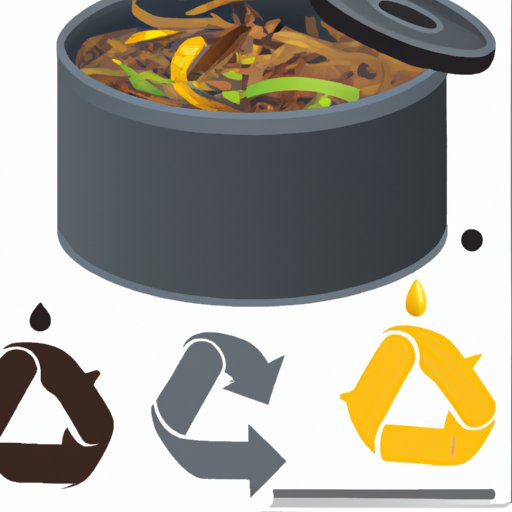Introduction
Cooking oil is an essential ingredient in many dishes, but disposing of it can be a tricky task. If poured down the sink or toilet, it can clog pipes and damage sewage systems. With proper disposal techniques, you can reduce environmental impact while helping ensure your plumbing remains intact.
In this article, we’ll explore where to dispose of cooking oil. We’ll look at methods such as using a grease trap, composting, recycling, donating, and reusing. Read on to learn how to properly dispose of cooking oil.
Use a Grease Trap for Home Cooking Oil Disposal
A grease trap is a device that captures fats, oils, and grease (FOG) from wastewater. It’s usually installed beneath the sink and helps prevent clogged drains and other problems caused by FOG buildup. The grease trap works by slowing down the flow of water, allowing the FOG to separate from the water and settle at the bottom of the trap.
Benefits of using a grease trap include:
- Reduced risk of clogged drains
- Reduced risk of damage to pipes and sewage systems
- Prevents odors from FOG buildup
- Helps keep waterways clean

Composting Cooking Oil with Food Waste
Composting is another great way to dispose of cooking oil. To compost cooking oil, mix it with food waste such as vegetable scraps and eggshells, then add it to an outdoor compost bin. The mixture should be about 25% cooking oil, 75% food waste. This will help ensure the oil doesn’t overwhelm the compost, as too much oil can cause issues such as unpleasant odors and pests.
Advantages of composting cooking oil include:
- Reduces methane emissions from landfills
- Produces nutrient-rich fertilizer for gardens and plants
- Reduces waste sent to landfills
- Helps create a healthier environment
Recycling Used Cooking Oil
Cooking oil can also be recycled. Many communities offer cooking oil recycling programs. Check with your local government to see if there are any programs available in your area. If not, you can recycle cooking oil through a commercial recycler.
Here’s how to recycle cooking oil:
- Allow used cooking oil to cool completely before handling.
- Pour the cooled oil into a sealable container, such as a plastic jug or jar.
- Label the container “used cooking oil” and take it to a local recycling center.
Benefits of recycling cooking oil include:
- Reduces the amount of cooking oil entering waterways and landfills
- Creates renewable energy sources such as biodiesel and biogas
- Decreases greenhouse gas emissions
- Creates jobs in the recycling industry

Donate to Animal Feed Companies
Cooking oil can also be donated to animal feed companies. These companies use cooking oil to produce animal feed products. Contact your local animal feed companies to see if they accept donations of cooking oil.
Advantages of donating cooking oil include:
- Reduces the amount of cooking oil entering waterways and landfills
- Provides an alternative source of protein for animals
- Creates jobs in the animal feed industry
- Reduces dependence on meat production

Reuse Cooking Oil as Fuel
Cooking oil can also be reused as fuel. It can be used to power cars, boats, and generators. However, it’s important to note that not all engines are designed to run on cooking oil, so check with your engine manufacturer before attempting to use cooking oil as fuel.
Types of fuel cooking oil can be used for include:
- Biodiesel
- Vegetable oil fuel
- Waste vegetable oil
- Straight vegetable oil
When reusing cooking oil as fuel, it’s important to be aware of safety concerns. Cooking oil is flammable, so it must be stored and handled properly. It’s also important to be aware of the potential health risks associated with breathing in fumes from burning cooking oil.
Drop-Off at Local Recycling Centers
Many communities have local recycling centers where you can drop off used cooking oil. Most centers will accept cooking oil in containers such as plastic jugs or jars. Be sure to label the container “used cooking oil” before dropping it off at the recycling center.
To find a local recycling center, contact your local government or search online. It’s also a good idea to call ahead to confirm the center accepts cooking oil before making the trip.
Contact Local Biofuel Companies
Biofuel companies can also provide an alternative method of disposing of cooking oil. These companies convert cooking oil into biodiesel, which is a renewable fuel source. Contact local biofuel companies to see if they accept donations of cooking oil.
Types of biofuel companies include:
- Biodiesel producers
- Vegetable oil fuel producers
- Waste vegetable oil producers
- Straight vegetable oil producers
Conclusion
Disposing of cooking oil can be a difficult task, but it’s important to do it properly. In this article, we explored where to dispose of cooking oil, including methods such as using a grease trap, composting, recycling, donating, and reusing. We also looked at the benefits of each method and discussed safety concerns when reusing cooking oil as fuel.
With these tips in mind, you’re now well-equipped to properly dispose of cooking oil. Remember to always check with your local government and recycling centers before disposing of cooking oil to ensure you’re following the proper guidelines.


